Nankai University graduate helps Yunnan village escape from poverty
p.china.org.cn by Liu Yizhou,April 27, 2021 Adjust font size:
“Ms. Hou, could you please authorize a certificate that indicates that my household is poverty-stricken for me?”
“No problem. Some of the other students in our village are in the same situation. Please tell them to visit me, so we can assist everyone.”
Presently stationed in Qincai village, Huize county, Qujing city, Yunnan province – a hamlet located at an average elevation of approximately 2,520 m that rises as high as 3,000 m above sea level and was impoverished until recently – Hou Chayan has had conversations like this countless times.
Born in 1994, Hou graduated from Tianjin municipality’s Nankai University a few years ago and is currently working as Qincai’s poverty reduction officer – a position she is well suited to. The harsh natural environment in the area does not bother her, and she has made great contributions to the village in the last two years.
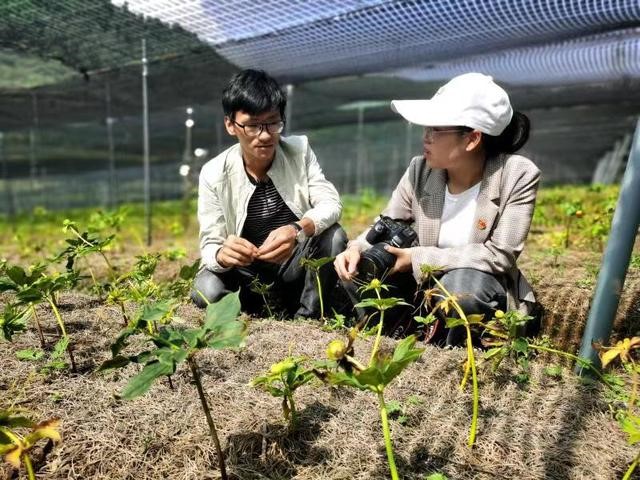
Hou Chayan examines herbs used in traditional Chinese medicine at a cultivation base in Qincai village, Huize county, Qujing city, Yunnan province. [Photo courtesy of Hou Chayan]
Making an impact in a community in her home province
Hou registered for Yunnan’s poverty alleviation examination when she was finishing her master’s program at Nankai’s Zhou Enlai School of Government in December 2017. She passed the test and became one of the 86 people who were chosen to work as poverty reduction officials in the southwestern Chinese province in 2018.
A classmate who was in the same program as Hou asked her why she wanted to move from a first-tier city to a small town in her home province. She told her that her presence or absence will not make much of a difference either way in a large metropolitan area and that she can make a greater impact in a rural area that needs her more.
Hou agreed to become a village-level official in 2019 and devoted herself to the nationwide battle against poverty.
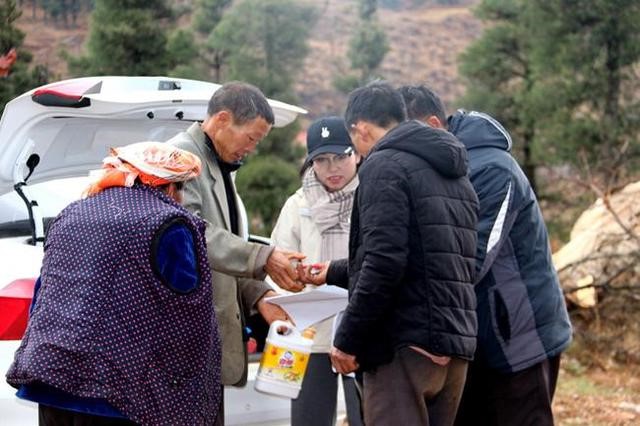
Qincai residents purchase household items and other goods from Hou (middle) using special points. A reward system was implemented in the village in which inhabitants can earn the points by completing certain tasks. [Photo courtesy of Hou Chayan]
A 2,000-km journey
Hou officially became a Qincai poverty alleviation official in March 2019. She wondered how many of the village’s residents would turn out to be impoverished, pondered how severe the situation might be, and thought of ways she could help during her 2,000-km journey in the area.
Hou began visiting impoverished households during the day and analyzing their situations and studying relevant poverty alleviation policies at night under the leadership of team leader Dong Zhengping after she arrived.
The official was not familiar with residents’ lifestyles and how they made their livings when she arrived, however. Hou was eager to learn more about them but was often unable to arrange meetings at first because she was unfamiliar with their habits and their schedules. She and her team eventually visited 152 poverty-stricken households and 49 non-impoverished households over the course of the next three months after discussing various strategies and suggestions, which made it possible for them to gain a general understanding of the village’s poverty-stricken households and Qincai as a whole.
“Impoverished people don’t become real, three-dimensional people until you visit them in their homes,” Hou explained recently. “This is the only way to get an accurate picture of what poverty looks like and formulate suitable plans to help them escape from it.”
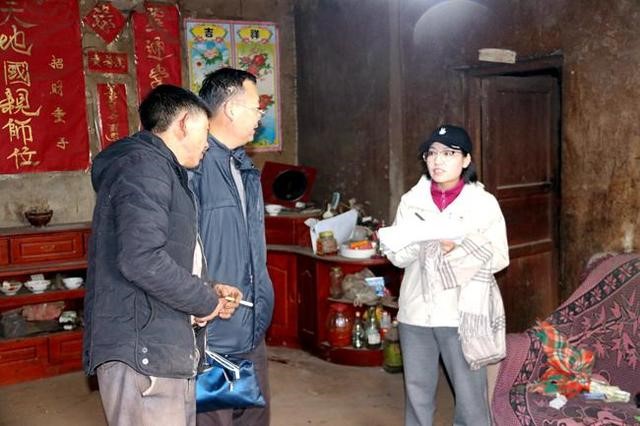
Hou visits an impoverished Qincai household. [Photo Courtesy of Hou Chayan]
Qincai’s “Teacher Hou”
“Ms. Hou, can you please authorize a certificate that indicates that my household is poverty-stricken for me?” a girl named Zeng Zhechun asked Hou on WeChat one day. “My father is too busy to come back to Qincai.”
“No problem,” Hou replied promptly. “I’m in the village now. I’ll give it to you when I get back. Tell your friends who are in the same situation, and we can save their parents’ time also.”
“Thank you, teacher!” Zeng said happily.
Youth in the Qincai area often refer to the official as “Hou teacher” due to the education-oriented efforts that she has made. The Yunnan native holds a degree in applied psychology, so she was invited to deliver a stress management seminar for more than 400 junior high school students that were preparing for the high school entrance examination in Jiache in June 2019. Hou also helped Zeng and six other students from Qincai apply for 3,000-yuan (US$462) grants under an initiative that was designed to enhance impoverished people’s educations and accelerate development in rural areas known as the Yulu Program.
Qincai students gradually started referring to the official as “Hou teacher” when she started engaging in these kinds of efforts. Recent university graduates often consult with her via WeChat during their job searches as well. Young people from the village think of Hou as a teacher, big sister and a mentor.
“I have to live up to everyone’s expectations and can’t lose their trust,” Hou noted. “I hope that I am worthy of this role and won’t have any regrets when I look back on my poverty alleviation work in Qincai in 10 or 20 years!”

Hou delivers a psychology lecture for local students. [Photo courtesy of Hou Chayan]
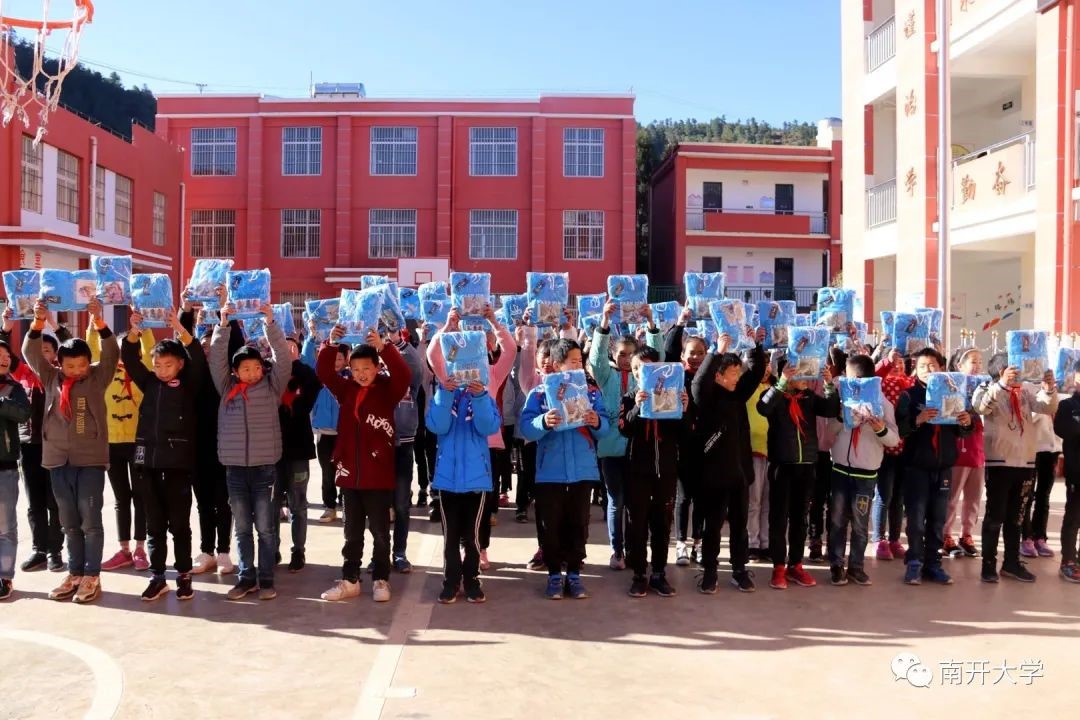
Qincai students hold up winter clothes that Hou arranged for them to receive in order to keep them warm. [Photo courtesy of Hou Chayan]
Improving motivation as a poverty reduction strategy
Hou and her teammates have made great efforts to promote infrastructure construction, prevent students from dropping out of school and help those who have reenrolled, improve drinking water safety and security, get dilapidated homes renovated, expand medical insurance coverage, ensure that people are receiving national pension insurance money that they are entitled to, and complete other useful tasks in Qincai over the last two years.
National rural housing renovation policies have made it possible for 367 families that were living in rundown homes in the village to get them renovated, all of the hamlet’s 614 households are currently connected to clean running water, every child is enrolled in school, a 93-ha strawberry farm employs 318 people at present, 16 km’s worth of dirt roads have been widened and paved, and other improvements have also been made.
Hou has noted that real poverty alleviation must include the development of a heartfelt desire to escape from poverty on the part of impoverished villagers in addition to the implementation of road construction, home renovation and employment programs because poverty can only be thoroughly eradicated when hard work and self-reliance are present.
Hou has conducted many seminars for impoverished families who live in villages that are under the administration of Jiache. She tells them vivid stories about advanced poverty eradication models and popularizes and explains national poverty alleviation policies related to education, healthcare, housing, agriculture, employment, and other areas in order to ensure that everyone is “familiar with the initiatives, grateful for the work being done and putting forth diligent effort.”
Hou also strives to harness the power of education for poverty reduction purposes. She has implemented partnership programs with schools in Beijing in order tohelp Jiache’s students broaden their horizons and establish more contact with the outside world.
On November 12, 2020, 874 of Jiache’s elementary school students received 2,764 items that Beijing Sixth Street Primary School donated to them and 36 of the school’s classes indicated that they plan to support a total of 36 impoverished Jiache students on a long-term basis.
Hou has made an important contribution to China’s battle against poverty. Her efforts have helped every Qincai household that was impoverished when she arrived escape from poverty; the problem has been eliminated throughout the village. Most of the muddy roads that she used to walk on have been paved, 100 solar-powered street lights illuminate the village at night, 152 households no longer have difficulty meeting their basic needs, and per capita net income has steadily exceeded the national poverty alleviation standard of 4,000 yuan (US$616).
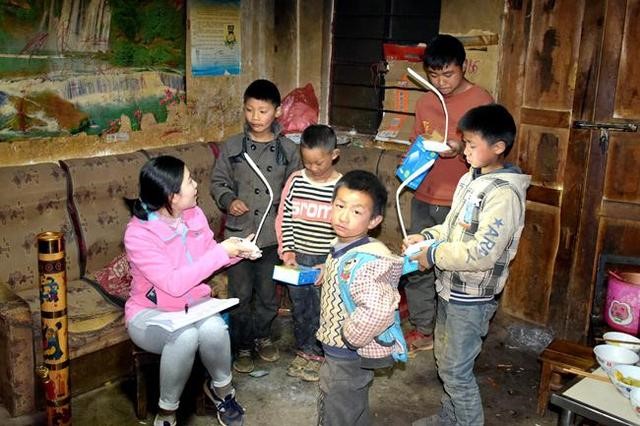
Hou distributes desk lamps to left-behind students. [Photo courtesy of Hou Chayan]